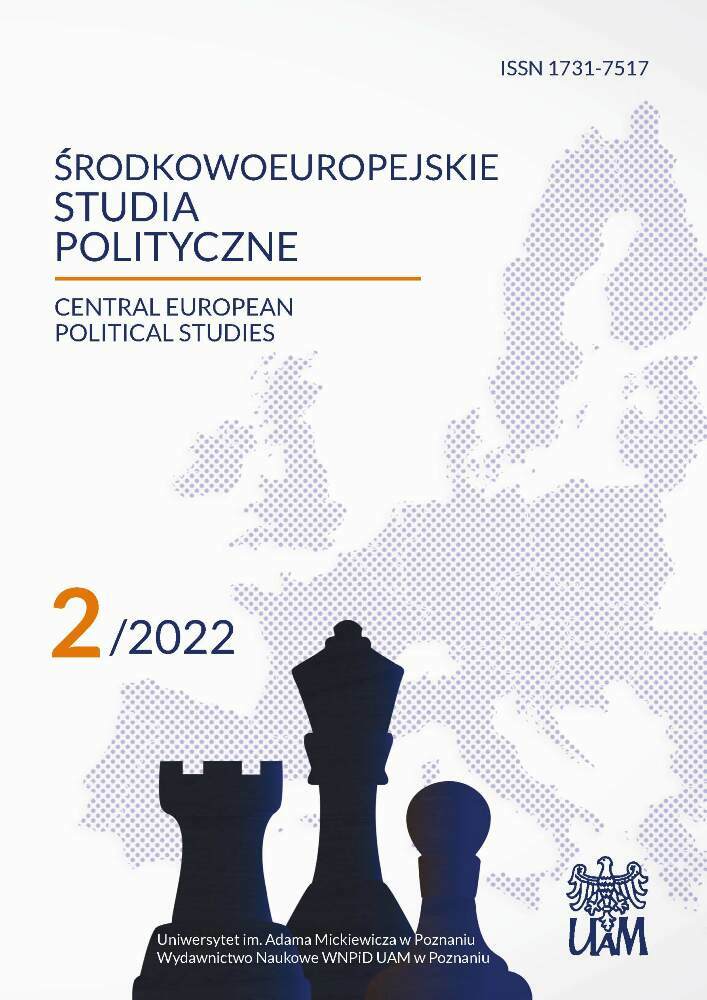Abstract
This article aims to present an evolution of the liberal model of world politics along with the potential consequences of this change at the level of the European integration project, taking into account the tools of the school of law and economics. The work elucidates basic elements of the idea of liberal democracy, both in internal (legal and economic system) and external dimensions (attitude to supranational organisations). The liberal order described in the text is confronted with critical statements delivered by creators of the concept of illiberal democracy, according to whom crisis of the paradigm of law and international economy can be currently observed. The recession of the liberal model of global politics is manifested in the tendency to modify the constitutional framework of particular countries and the decomposition of integration processes that have been anchoring liberal order in a united Europe so far. According to the author, the above phenomenon may initiate a split in the Western world, leading to the breakdown of its political unity and the beginning of the era of uncertainty, as a prelude to the emergence of a new order on the Old Continent, the framework of which is not yet known.
References
Abts K., Rummens S. (2007), Populism versus Democracy, “Political Studies”, 55 (2), pp. 405–424.
Ágh A. (2016), The Decline of Democracy in East-Central Europe. Hungary as the Worst-Case Scenario, “Problems of Post-Communism”, no. 63 (5–6).
Albertazzi D., Müller S. (2013), Populism and Liberal Democracy: Populism in Government in Austria, Italy, Poland and Switzerland, “Government and Opposition”, no. 48 (3).
Albrecht P. A. (2009), Strengthen the Judiciary Independence in Europe!: International Recommendation for an Independent Judicial Power, Berlin–Antwerpen.
Antoszewski A. (2017), Suwerenność ludu – podejście liberalne, in: Suwerenność państwa członkowskiego Unii Europejskiej, eds. P. Stawarz, T. Wallas, K. A. Wojtaszczyk, Warszawa.
Bellamy R. (1997), Liberal Politics and the Judiciary: The Supreme Court and American Democracy, “Res Publica”, no. 1.
Bokajło W. (2017), Słabość liberalnej demokracji siłą dyktatury. Casus Niemiec, in: Od historii myśli do praktyki politycznej, eds. J. Sielezin, R. Wiszniowski, M. Alberska, Toruń.
Buzogány A. (2017), Illiberal democracy in Hungary: authoritarian diffusion or domestic causation?, “Democratisation”, no. 24 (7).
Cerny P. G. (1999), Globalization and the Erosion of Democracy, “European Journal of Political Research”, no. 1.
Dawson J., Hanley S. (2016), The Fading Mirage of the “Liberal Consensus”, “Journal of Democracy”, no. 27 (1).
David I. (2015), Rethinking Liberal Democracy: Prelude to Totalitarianism, “Journal of Liberty and International Affairs”, no. 1.
della Porta D. (2013), Can Democracy be Saved? Participation, Deliberation and Social Movements, Cambridge.
Diamond L. (1999), Developing Democracy. Toward Consolidation, Baltimore–London.
Diamond L. (1996), Is the Third Wave Over?, “Journal of Democracy”, no. 3.
Gargarella R. (2010), Większościowe odczytanie rządów prawa, in: Demokracja i rządy prawa, eds. J. Maravall, A. Przeworski, Warszawa.
Gawin D. (2007), Granice demokracji liberalnej, Kraków.
Habets I. (2015), Liberal Democracy: the Threat of Counter-Narratives, “European View”, no. 1.
Inglehart R. (2016), How Much Should We Worry?, “Journal of Democracy”, no. 3.
Ingraham L. (2017), Billionaire at the Barricades: The Populist Revolution from Reagan to Trump, New York.
Junes T. (2016), Illiberalism and authoritarianism can be successfully challenged in Poland, OpenDemocracy. Free Thinking for the World.
Kaczmarczyk H. (2017), Legitymizacja sądownictwa konstytucyjnego, in: Dwadzieścia lat obowiązywania Konstytucji RP. Polska myśl konstytucyjna a międzynarodowe standardy demokratyczne, eds. J. Jaskiernia, K. Spryszak, Toruń.
Karatnycky A. (1999), The Decline of Illiberal Democracy, “Journal of Democracy”, no. 1.
Krastev I. (2007), The Strange Death of Liberal Consensus, “Journal of Democracy”, no. 18 (4).
Krastev I. (2016), The Unraveling of the Post-1989 Order, “Journal of Democracy”, no. 27 (4).
Krastev I., Smilov D. (2008), The Rise of Populism in Eastern Europe: Policy Paper, in: Populist Politics and Liberal Democracy in Central and Eastern Europe, eds. G. Mesežnikov, O. Gyárfášová, D. Smilov, Bratislava.
Kruk K. (2016), Zmierzch czy renesans liberalnej demokracji, Instytut Obywatelski, http://www.instytutobywatelski.pl/25569/komentarze/spoleczenstwo-komentarze/zmierzch-czy-renesansliberalnej-demokracji.
Łętowska E. (2017), Państwo prawa na peryferiach Europy. O transformacji w Polsce w latach 1988–2016, Public Seminar, http://www.publicseminar.org/wp-content/uploads/2017/07/Ewa-Letowska-wroclaw-address-in-PL.pdf.
Mouffe Ch. (2011), Carl Schmitt i paradoks demokracji liberalnej, in: Carl Schmitt: wyzwanie polityczności, ed. Ch. Mouffe, Warszawa.
Öniş Z. (2017), The Age of Anxiety: The Crisis of Liberal Democracy in a Post-Hegemonic Global Order, “The International Spectator”, no. 3.
Pabst A. (2016), Is Liberal Democracy Sliding into “Democratic Despotism”, “Political Quarterly”, no. 1.
Pappas T. (2016), Distinguishing Liberal Democracy’s Challengers, “Journal of Democracy”, no. 27 (4).
Schmitter P. (2015), Crisis and Transition, But Not Decline, “Journal of Democracy”, no. 26 (1).
Streeck W. (2014), Buying Time. The Delayed Crisis of Democratic Capitalism, London–New York.
The role of the judiciary in a state governed by the rule of law: proceedings: Round table of the ministers of justice from countries of central and eastern Europe, organised by the Council of Europe with the cooperation of the Minister of Justice of the Republic of Poland, Warsaw (Poland), 4 April 1995.
Vanderhill R. (2017), Active resistance to democratic diffusion, “Communist and Post-Communist Studies”, no. 50 (1).
License
Copyright (c) 2022 Artur Niedźwiecki

This work is licensed under a Creative Commons Attribution 4.0 International License.

